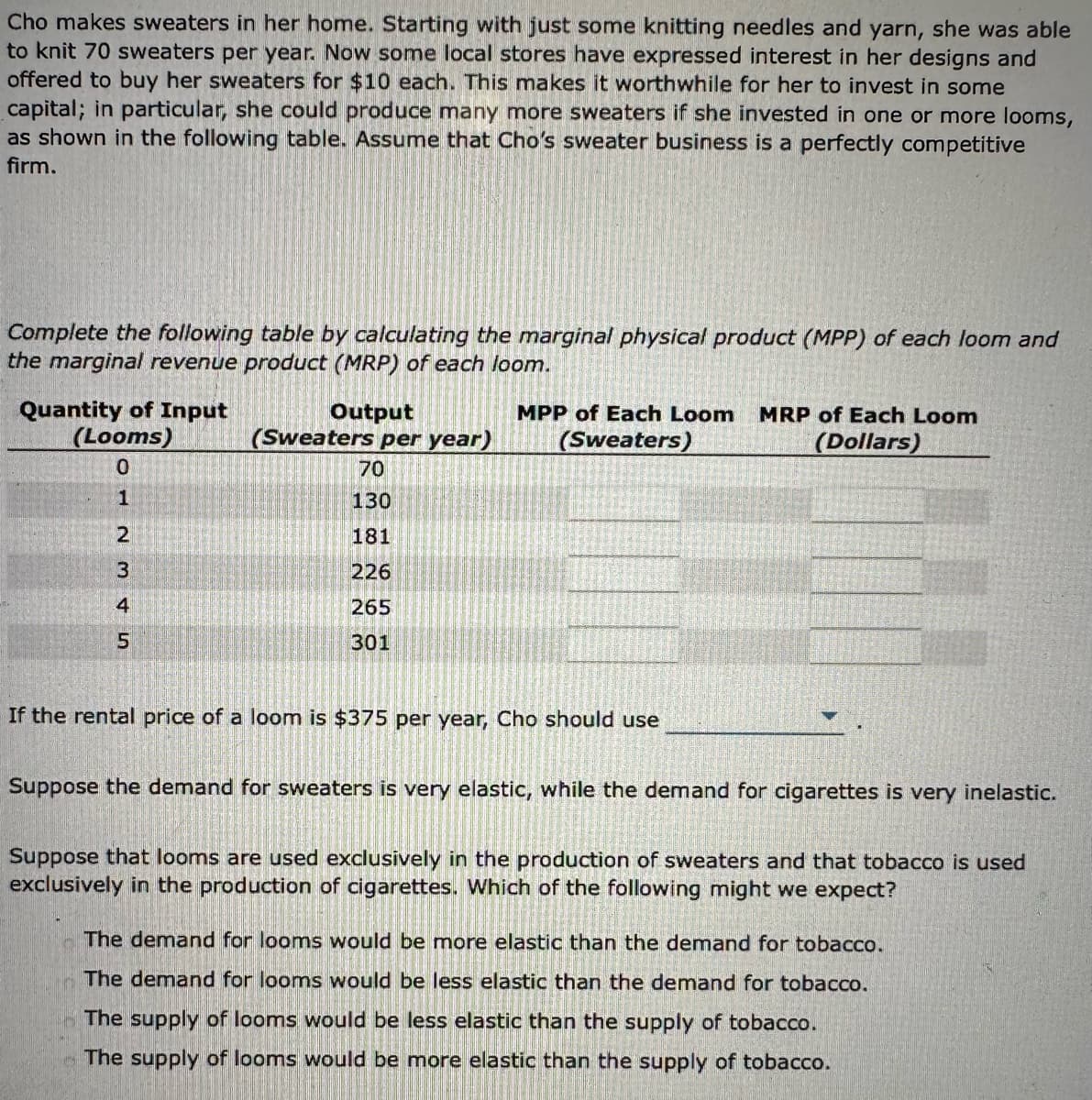Cho makes sweaters in her home. Starting with just some knitting needles and yarn, she was able to knit 70 sweaters per year. Now some local stores have expressed interest in her designs and offered to buy her sweaters for $10 each. This makes it worthwhile for her to invest in some capital; in particular, she could produce many more sweaters if she invested in one or more looms, as shown in the following table. Assume that Cho's sweater business is a perfectly competitive firm. Complete the following table by calculating the marginal physical product (MPP) of each loom and the marginal revenue product (MRP) of each loom. Quantity of Input (Looms) 812345 0 Output (Sweaters per year) 70 130 181 226 265 301 MPP of Each Loom MRP of Each Loom (Sweaters) (Dollars) If the rental price of a loom is $375 per year, Cho should use Suppose the demand for sweaters is very elastic, while the demand for cigarettes is very inelastic. Suppose that looms are used exclusively in the production of sweaters and that tobacco is used exclusively in the production of cigarettes. Which of the following might we expect? The demand for looms would be more elastic than the demand for tobacco. The demand for looms would be less elastic than the demand for tobacco. The supply of looms would be less elastic than the supply of tobacco. The supply of looms would be more elastic than the supply of tobacco.
Cho makes sweaters in her home. Starting with just some knitting needles and yarn, she was able to knit 70 sweaters per year. Now some local stores have expressed interest in her designs and offered to buy her sweaters for $10 each. This makes it worthwhile for her to invest in some capital; in particular, she could produce many more sweaters if she invested in one or more looms, as shown in the following table. Assume that Cho's sweater business is a perfectly competitive firm. Complete the following table by calculating the marginal physical product (MPP) of each loom and the marginal revenue product (MRP) of each loom. Quantity of Input (Looms) 812345 0 Output (Sweaters per year) 70 130 181 226 265 301 MPP of Each Loom MRP of Each Loom (Sweaters) (Dollars) If the rental price of a loom is $375 per year, Cho should use Suppose the demand for sweaters is very elastic, while the demand for cigarettes is very inelastic. Suppose that looms are used exclusively in the production of sweaters and that tobacco is used exclusively in the production of cigarettes. Which of the following might we expect? The demand for looms would be more elastic than the demand for tobacco. The demand for looms would be less elastic than the demand for tobacco. The supply of looms would be less elastic than the supply of tobacco. The supply of looms would be more elastic than the supply of tobacco.
Managerial Economics: Applications, Strategies and Tactics (MindTap Course List)
14th Edition
ISBN:9781305506381
Author:James R. McGuigan, R. Charles Moyer, Frederick H.deB. Harris
Publisher:James R. McGuigan, R. Charles Moyer, Frederick H.deB. Harris
Chapter2: Fundamental Economic Concepts
Section: Chapter Questions
Problem 4E
Related questions
Question
Uncertain how to solve correctly

Transcribed Image Text:Cho makes sweaters in her home. Starting with just some knitting needles and yarn, she was able
to knit 70 sweaters per year. Now some local stores have expressed interest in her designs and
offered to buy her sweaters for $10 each. This makes it worthwhile for her to invest in some
capital; in particular, she could produce many more sweaters if she invested in one or more looms,
as shown in the following table. Assume that Cho's sweater business is a perfectly competitive
firm.
Complete the following table by calculating the marginal physical product (MPP) of each loom and
the marginal revenue product (MRP) of each loom.
Quantity of Input
(Looms)
0
UAWNHI
1
2
3
4
5
Output
(Sweaters per year)
70
130
181
226
265
301
MPP of Each Loom MRP of Each Loom
(Sweaters)
(Dollars)
If the rental price of a loom is $375 per year, Cho should use
Suppose the demand for sweaters is very elastic, while the demand for cigarettes is very inelastic.
Suppose that looms are used exclusively in the production of sweaters and that tobacco is used
exclusively in the production of cigarettes. Which of the following might we expect?
The demand for looms would be more elastic than the demand for tobacco.
The demand for looms would be less elastic than the demand for tobacco.
The supply of looms would be less elastic than the supply of tobacco.
The supply of looms would be more elastic than the supply of tobacco.
Expert Solution
This question has been solved!
Explore an expertly crafted, step-by-step solution for a thorough understanding of key concepts.
This is a popular solution!
Trending now
This is a popular solution!
Step by step
Solved in 5 steps

Knowledge Booster
Learn more about
Need a deep-dive on the concept behind this application? Look no further. Learn more about this topic, economics and related others by exploring similar questions and additional content below.Recommended textbooks for you

Managerial Economics: Applications, Strategies an…
Economics
ISBN:
9781305506381
Author:
James R. McGuigan, R. Charles Moyer, Frederick H.deB. Harris
Publisher:
Cengage Learning

Principles of Economics 2e
Economics
ISBN:
9781947172364
Author:
Steven A. Greenlaw; David Shapiro
Publisher:
OpenStax

Managerial Economics: Applications, Strategies an…
Economics
ISBN:
9781305506381
Author:
James R. McGuigan, R. Charles Moyer, Frederick H.deB. Harris
Publisher:
Cengage Learning

Principles of Economics 2e
Economics
ISBN:
9781947172364
Author:
Steven A. Greenlaw; David Shapiro
Publisher:
OpenStax